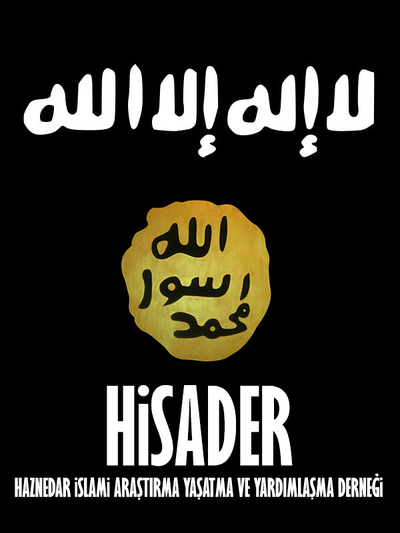 <-- caption begin -->
<-- caption begin -->Abu Muhammad of ISIS in Hatay State Hospital in April 2014, recovering from wounds received fighting in Syria.<-- caption end -->
Posted on 06/18/2014 3:16:13 AM PDT by markomalley
The battle in Iraq consists of "Turkish-backed Sunni jihadis rebelling against an Iranian-backed Shi'ite-oriented central government," I wrote in a recent article.
Some readers question that the Republic of Turkey has supported the "Islamic State in Iraq and Syria," the main Sunni group fighting in Iraq. They point to ISIS attacks on Turkish interests, within Turkey, along its border with Syria, and in Mosul and a successful recent meeting of the Turkish and Iranian presidents. Good points, but they can be explained.
First, ISIS is willing to accept Turkish support even while seeing the Islamist prime minister and his countrymen as kafirs (infidels) who need to be shown true Islam.
Second, the presidential visit took place on one level while the fighting in Syria and Iraq took place on quite another; the two can occur simultaneously. Turkish-Iranian rivalry is on the rise and, as the distinguished Turkish journalist Burak Bekdil notes in the current issue of the Middle East Quarterly:
Recent years have often seen official language from the two countries about prospering bilateral trade and common anti-Israeli ideological solidarity. But mostly out of sight have been indications of rivalry, distrust, and mutual sectarian suspicion between the two Muslim countries.
Ankara may deny helping ISIS, but the evidence for this is overwhelming. "As we have the longest border with Syria," writes Orhan Kemal Cengiz, a Turkish newspaper columnist, "Turkey's support was vital for the jihadists in getting in and out of the country." Indeed, the ISIS strongholds not coincidentally cluster close to Turkey's frontiers.
Kurds, academic experts and the Syrian opposition agree that Syrians, Turks (estimated to number 3,000), and foreign fighters (especially Saudis but also a fair number of Westerners) have crossed the Turkish-Syrian border at will, often to join ISIS. What Turkish journalist Kadri Gursel calls a "two-way jihadist highway," has no bothersome border checks and sometimes involves the active assistance of Turkish intelligence services. CNN even broadcast a video on "The secret jihadi smuggling route through Turkey."
Actually, the Turks offered far more than an easy border crossing: they provided the bulk of ISIS' funds, logistics, training and arms. Turkish residents near the Syrian border tell of Turkish ambulances going to Kurdish-ISIS battle zones and then evacuating ISIS casualties to Turkish hospitals. Indeed, a sensational photograph has surfaced showing ISIS commander Abu Muhammad in a hospital bed receiving treatment for battle wounds in Hatay State Hospital in April 2014.
 <-- caption begin --> <-- caption begin -->Abu Muhammad of ISIS in Hatay State Hospital in April 2014, recovering from wounds received fighting in Syria.<-- caption end --> |
One Turkish opposition politician estimates that Turkey has paid $800 million to ISIS for oil shipments. Another politician released information about active duty Turkish soldiers training ISIS members. Critics note that Turkish Prime Minister Recep Tayyip Erdoğan, has met three times with someone, Yasin al-Qadi, who has close ties to ISIS and has funded it.
 <-- caption begin --> <-- caption begin -->The flag of Rojava, or Syria Kurdistan.<-- caption end --> |
Why the Turkish support for wild-eyed extremists? Because Ankara wants to eliminate two Syrian polities, the Assad regime in Damascus and Rojava (the emerging Kurdish state) in the northeast.
Regarding the Assad regime: "Thinking that jihadists would ensure a quick fall for the Assad regime in Syria, Turkey, no matter how vehemently officials deny it, supported the jihadists," writes Cengiz, "at first along with Western and some Arab countries and later in spite of their warnings."
Regarding Rojava: Rojava's leadership being aligned with the PKK, the (formerly) terrorist Kurdish group based in Turkey, the authoritative Turkish journalist Amberin Zaman has little doubt "that until recently, Turkey was allowing jihadist fighters to move unhindered across its borders" to fight the Kurds.
More broadly, as the Turkish analyst Mustafa Akyol notes, Ankara thought "anybody who fought al-Assad was a good guy and also harbored an "ideological uneasiness with accepting that Islamists can do terrible things." This has led, he acknowledges, to "some blindness" toward violent jihadists. Indeed, ISIS is so popular in Turkey that others publicly copy its logo.
 <-- caption begin --> <-- caption begin -->An Istanbul-based charity (acronym: HİSADER) has adopted the ISIS logo with the Islamic statement of faith.<-- caption end --> |
In the face of this support, the online newspaper Al-Monitor calls on Turkey to close its border to ISIS while Rojava threatened Ankara with "dire consequences" unless Turkish aid ceases.
In conclusion, Turkish leaders are finding Syria a double quagmire, what with Assad still in power and the Kurdish entity growing stronger. In reaction, they have cooperated with even the most extreme, retrograde and vicious elements, such as ISIS. But this support opened a second front in Iraq which, in turn, brings the clash of the Middle East's two titans, Turkey and Iran, closer to realization.
Frankly, for this reason, I think Pipes' views are somewhat Pollyanish.
He also seems to overlook others in the Islamic world who are also wanting to reestablish the Caliphate: Pakistan and Saudi Arabia. I may be wrong, but I think the ISIS and Taliban have more affinity to the Saudi’s religious leaders than to Turkish.
Kind of like our war with Iran while Kerry talks with them about peace, peace and killing ISIS?
Turkey's in NATO. Turkey's been helpful to ISIS, who seem to be Nazi-level butchers. Turkey has part of a Kurdish population which I'd think at this point will be doing whatever it takes to be an independent nation.
Is NATO at some point going to have to defend Turkey against the terrorists that Turkey enabled?
It just keeps getting messier.
What is the dissection of ISIS support between Saudi, Turkey and others?
Turkey could tie Benghazi to ISIS.
Disclaimer: Opinions posted on Free Republic are those of the individual posters and do not necessarily represent the opinion of Free Republic or its management. All materials posted herein are protected by copyright law and the exemption for fair use of copyrighted works.